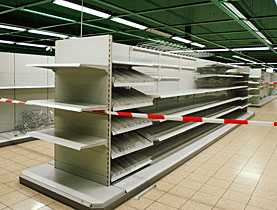
Retail decline tipped to dent property market

The Swiss retail sector will shortly experience a major upheaval as the economic downturn exposes underlying problems in the market, according to a report.
While the global recession is not expected to hit Switzerland as hard as other countries, it could force some shops to the wall and others to reverse their recent strategy of increasing floor space.
Tuesday’s real estate report from Credit Suisse bank predicts the start of a downsizing trend in offices and shops, leading to a disparity between supply and demand.
Some chains, which have recently increased their number of outlets to meet the challenge of international competition, may now find their expansion plans are unsustainable as profits take a tumble.
“The retail chains will then scrutinise their branch network for unprofitable locations, which will be closed as part of a downscaling process,” the report states.
Winners and losers
Smaller stores may start to feel the squeeze in more dramatic ways with the retail sector now over-saturated with competitors, and prime locations moving more towards shopping malls and commuter hotspots, such as railway stations and airports.
Switzerland has seen a dramatic expansion in shopping malls in the past decade, more than doubling since 1995 from 820,000 square metres to nearly two million. Not all malls are having an easy time, but their overall effect is starting to show, according to Credit Suisse’s Fredy Hasenmaile.
He predicts a growing divide between winners and losers in the retail market.
“More and more people are getting used to buying their goods in the new malls,” he told swissinfo. “Small retailers who used to have a lot of customers in the past have lost them to these new places. They will face increasing problems and some will probably have to close down or move location.”
Since 1985 the number of small independent food stores in Switzerland has declined from 6,000 to 2,626, the report states.
Housing market stable
But the real estate report was not all bad news, maintaining that the sector as a whole should come out of the global recession relatively unscathed. Switzerland’s residential housing market, in particular, should remain stable in contrast to collapses in other countries.
The main driver of sustainability has been an increase in immigrants – mainly highly skilled workers – who have buoyed demand for housing. According to Credit Suisse, the net inflow of 100,000 new residents in 2008 increased demand for new homes by 13,700.
“Switzerland has a big advantage of not starting the crisis with an over-supply of property thanks to this immigration boom,” Hasenmaile told swissinfo.
Credit Suisse predicts the construction of around 40,000 new housing units per year until 2011 with demand falling slightly, but not significantly. As a result, prices should remain stable in most areas but cool off in hotspots such as Geneva, Zurich and popular tourist destinations.
swissinfo, Matthew Allen
The Swiss property market has recovered from the collapse of the early to mid 1990s that cost banks SFr42 billion ($37.6 billion).
Construction of new housing reached a 10-year high of 47,000 homes in 2005.This year, some 42,000 new homes are expected to be built.
So far, the demand for new housing has matched supply, with the number of empty properties falling from 1.07% in 2007 to 0.97% last year. Demand is expected to reduce slightly in the following two years.
But Switzerland is not a country of homeowners, with the rate of ownership rising from just 31% in 1990 to around 37% at present.
In international comparison, the 34.6% Swiss home ownership rate in 2000 compared with 45% in Germany, 54% in France, 69% in Britain and the US, and 81% in Spain.

In compliance with the JTI standards
More: SWI swissinfo.ch certified by the Journalism Trust Initiative


























You can find an overview of ongoing debates with our journalists here . Please join us!
If you want to start a conversation about a topic raised in this article or want to report factual errors, email us at english@swissinfo.ch.